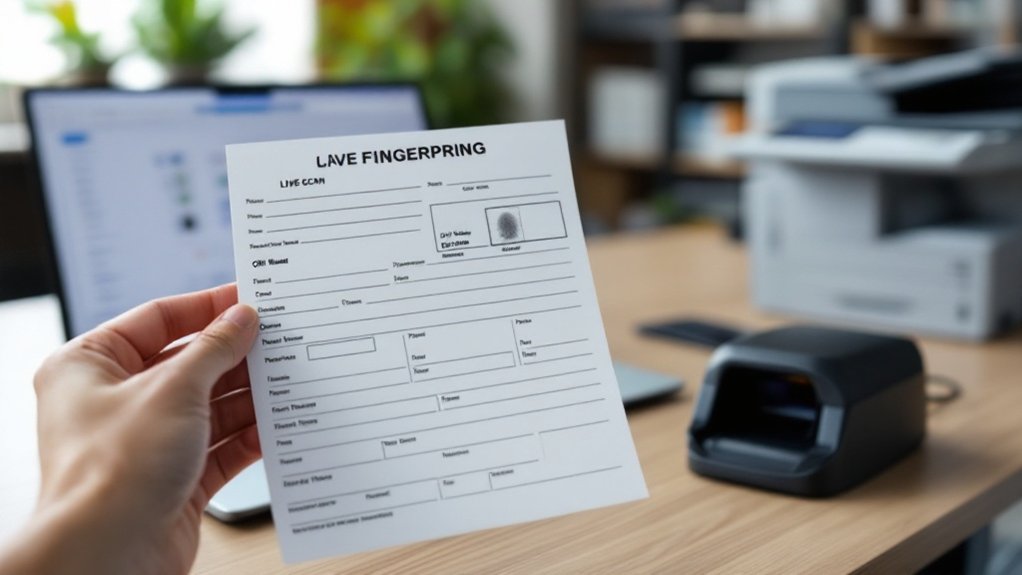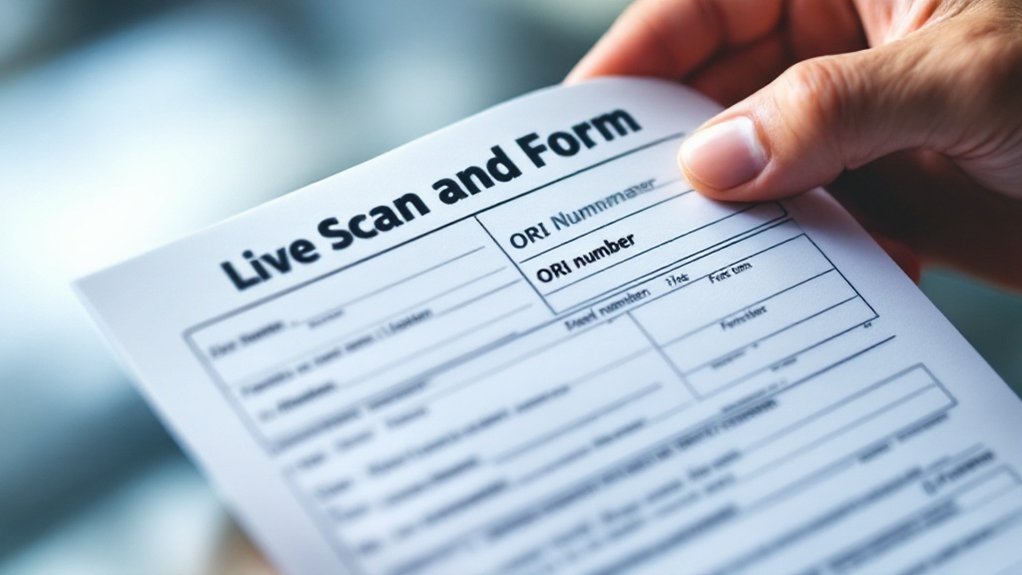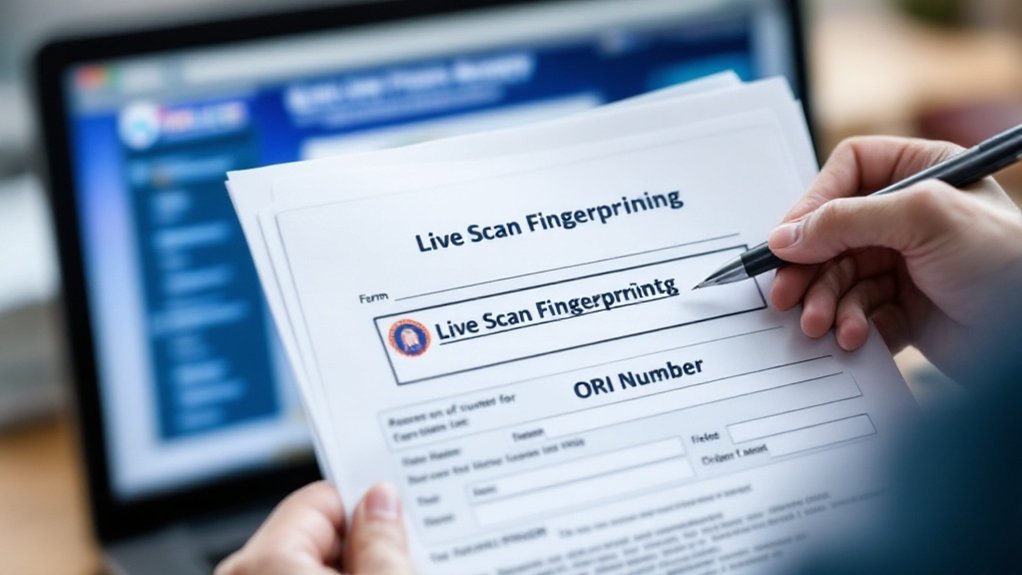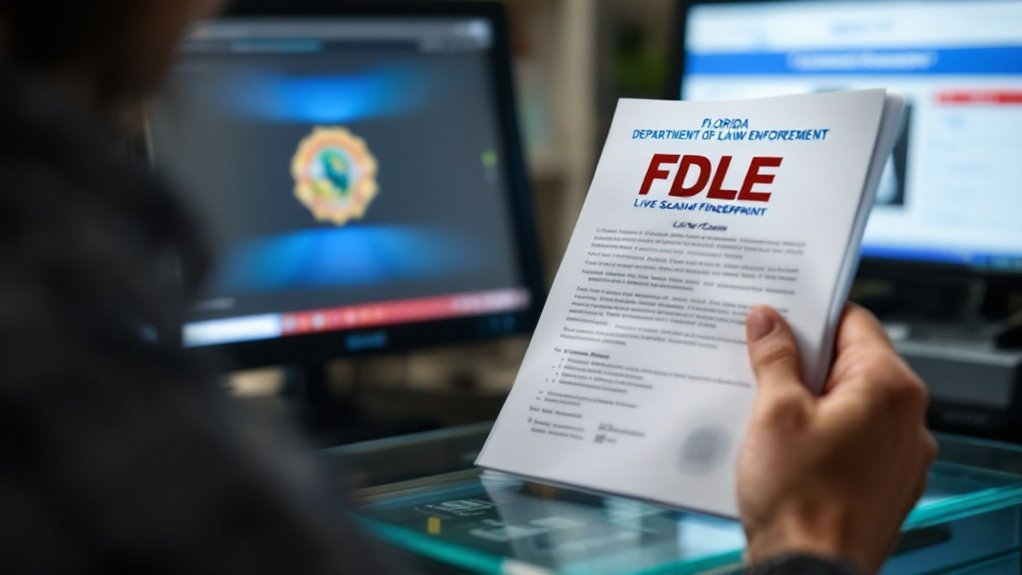To get your ORI number for live scan fingerprinting, you’ll need to contact the agency requiring the background check. They should provide you with the ORI number, which is typically a 9-digit code starting with 2-5 letters followed by numbers. Validate this number with the agency before your appointment to guarantee results are sent correctly. If you’re an employer, you might need to contact the NCIC Control Terminal Officer or FBI CJIS Division to initiate the process. For more on ORI numbers and their role in background checks, you can explore further.
Understanding ORI Numbers

Understanding ORI numbers is essential for anyone undergoing Live Scan fingerprinting. An ORI, or Originating Agency Identifier Number, is a unique identifier assigned to agencies for fingerprinting services. It guarantees that background check results are sent to the correct agency, making it critical for accurate processing. Incorrect ORI numbers can cause delays and misrouting of results, so providing the right one is crucial for licensing, employment, and other applications.
ORI numbers typically start with 2-5 letters followed by numbers, forming a 9-digit code. They are assigned by the FBI or state agencies and are unique to each authorized agency. This safeguards confidentiality and efficiency in background checks, making them essential for maintaining privacy and security.
Obtaining an ORI Number
To obtain an ORI number for Live Scan fingerprinting, you must apply through the California Department of Justice (DOJ). You can contact the DOJ via their website or by emailing “[email protected]” for instructions on the application process. Typically, it takes 4-6 weeks to receive an ORI number after applying, and if you haven’t received it within six weeks, you should contact the ORI Department directly for follow-up. Once you have your ORI number, you can use it to submit fingerprints via Live Scan, which requires an ORI code to identify your agency.
Obtaining an ORI Number
Obtaining an ORI number involves several steps, primarily aimed at guaranteeing that your agency meets the necessary criteria set by the FBI. To start, contact your NCIC Control Terminal Officer (CTO) or the FBI’s CJIS Division to initiate the process. Only agencies that meet specific FBI criteria can be assigned an ORI number. Once assigned, it’s vital to verify the number directly from the agency, as changes can occur. Fingerprint cards can be ordered with or without pre-printed ORI numbers, and there is no charge for these cards or training aids. Always confirm that your staff is trained on the proper use and management of ORI numbers. The ORI number serves as a unique identifier, typically a nine-character code, which is crucial for accessing and submitting criminal justice information through the NCIC system.
Request Agency
As you prepare to obtain an ORI number for your agency, it’s important to recognize that you’re taking a key step in guaranteeing that background checks are processed efficiently and securely. A requesting agency, like yours, requires individuals to undergo Live Scan fingerprinting for purposes such as employment or licensing. Your role involves submitting fingerprint-based background check requests to state or federal law enforcement agencies using an ORI number. Ensuring the accuracy of the ORI code is crucial because it prevents misrouting of results and ensures timely processing of background checks. Examples of requesting agencies include schools, healthcare institutions, and law enforcement departments. In California, agencies must be mandated by state statute to apply for an ORI number. This process safeguards that background check results are sent to the correct agency, maintaining legal compliance and privacy protection.
Using ORI Numbers in Live Scan

When you’re getting ready for Live Scan fingerprinting, using your ORI number accurately is critical. This unique identifier guarantees that your background check results are sent to the correct agency. You must fill out the ORI number correctly on the Live Scan Service Form to avoid delays or misrouting of your results.
To use your ORI number effectively, verify it with the requesting agency before your appointment. Confirm that the form is up-to-date and that you’ve selected the correct applicant type. This attention to detail will help you navigate the fingerprinting process smoothly and certify that your results reach the intended recipient.
Importance of Correct ORI Numbers
How vital is it to get your ORI number right for Live Scan fingerprinting? It’s imperative because incorrect ORI numbers can lead to delays, misrouting of results, and additional costs. You should verify your ORI number with the requesting agency to ascertain accuracy. This number helps maintain privacy by sending arrest records to authorized recipients and facilitates timely processing of background checks.
Using the correct ORI number guarantees compliance with relevant statutes and regulations, specifying which offenses to scrutinize and where to send results. It’s essential for Level 2 Background Checks and helps avoid legal issues by ensuring results are sent to the right agency. Always double-check your ORI number to avoid errors. Additionally, understanding the role of the OCA number is crucial, as it identifies the entity requesting the background check and ensures that results are sent to the correct recipient.
Common ORI Number Uses

When you’re involved in employment screening, licensing requirements, or volunteer checks, you’ll often encounter ORI numbers. These identifiers are vital for directing background check results to the right agency, making sure that your fingerprints are processed correctly, and verifying the legitimacy of the requesting agency. By understanding how ORI numbers are used in these contexts, you can guarantee that your background checks are handled efficiently and accurately.
Employment Screening
Professions like doctors, nurses, daycare workers, caretakers of the elderly, real estate agents, car dealers, restaurateurs, and security officers require Level 2 Background checks, which involve the use of ORI numbers. These checks are indispensable in industries such as healthcare, childcare, and security services. The ORI number guarantees that background check results are sent to the correct state department or agency, facilitating employment screening.
You will typically receive the ORI number from your employer as part of the hiring process. If needed, employers can contact regulating agencies to obtain the specific ORI number for a job type. It’s important to verify the ORI number with the requesting agency to avoid delays or misrouting of results. Additionally, a Level 2 Background Check must include a valid ORI number to ensure that the results are processed correctly and sent to the appropriate agency.
Licensing Requirements
In licensing processes, ORI numbers play a pivotal role by guaranteeing that background check results are directed to the correct agency. This is indispensable for preventing delays and misrouting of results. ORI numbers are essential for various licensing applications, including professional certifications and permits.
Some common uses of ORI numbers in licensing include:
- Professional Certifications: Ensuring background checks align with specific job requirements.
- Healthcare Licenses: Required for medical professionals to ensure compliance with healthcare regulations.
- Insurance Licenses: Necessary for insurance agents and brokers.
- Educational Certifications: Used for teacher certifications and other educational roles.
- State Permits: Required for various state-specific permits and licenses.
The use of ORI numbers ensures that the results are sent to the appropriate state department, which is crucial for maintaining compliance with licensing requirements, particularly those involving a Level 2 Background Check.
Volunteer Checks**
Volunteer background checks often involve the use of specific ORI numbers, which are indispensable for guaranteeing that fingerprinting results are sent to the correct agency or organization. For volunteers, VECHS numbers starting with “V” are commonly used. These numbers guarantee that results are directed correctly, typically to schools or daycares. It’s pivotal to verify the ORI number with the requesting agency to avoid delays or misrouting of results. In Illinois, fingerprinting services are provided at over 40 convenient locations, offering services like Live Scan fingerprinting for various purposes. When undergoing a volunteer background check, you’ll typically need to provide an ORI number as part of the Live Scan fingerprinting process. This process requires a Level 2 background check, which must include an ORI number to ensure accurate processing and delivery of results.
Troubleshooting ORI Number Issues
Troubleshooting ORI number issues is pivotal to avoid delays and complications in the Live Scan fingerprinting process. If you submit an application with an incorrect ORI, you’ll need to withdraw it through the Firearms Investigator at the local police department and resubmit with the correct ORI. Here are some key considerations:
- Incorrect Submission: No refunds are available for withdrawn applications.
- Withdrawal Process: Initiated by the local police department.
- Fingerprint Transfer: May be necessary if fingerprints were taken with an incorrect ORI.
- Avoiding Delays: Verify the ORI with the requesting agency.
- Additional Costs: Errors may lead to resubmission fees. Ensuring accurate submission of the ORI Number is crucial, as it serves as a unique identifier for each police department and is required for processing firearms applications.
FDLE Fingerprinting Requirements

To navigate the FDLE fingerprinting process effectively, you need to understand its requirements thoroughly. FDLE fingerprinting is necessary for employment, licensure, volunteer work, adoption, and foster care. The process involves electronic submission of fingerprints through approved service providers. You’ll need a valid government-issued ID and specific forms related to the purpose of the fingerprinting.
For most scans, an ORI number is required to direct results to the correct agency. Fees vary by provider, and payment methods include cash or credit/debit cards. Depending on the purpose, additional documentation like employer IDs or license application numbers may be needed. Guarantee you have all necessary documents to avoid delays.
Submission Process for FDLE Live Scan**
The submission process for FDLE Live Scan fingerprinting involves several key steps. You need to find a certified provider, such as local law enforcement or third-party vendors approved by the FDLE. Here are some essential details to ponder:
- ORI Number: Obtain from the requesting agency.
- Required Documents: Bring a valid government-issued ID and the ORI number.
- Fingerprint Capture: Fingerprints are electronically captured using a digital scanner.
- Submission: Fingerprints are sent to the FDLE and possibly the FBI.
- Tracking: Use the Transaction Control Number (TCN) to track the status of your submission.
Conclusion
You’ve successfully navigated the process of obtaining and using an ORI number for live scan fingerprinting. Intriguingly, over 90% of live scan submissions are processed automatically, highlighting the efficiency of this system. Vital ORI numbers are indispensable for ensuring that your fingerprints are sent to the right agency, making them essential for background checks and employment verification.

